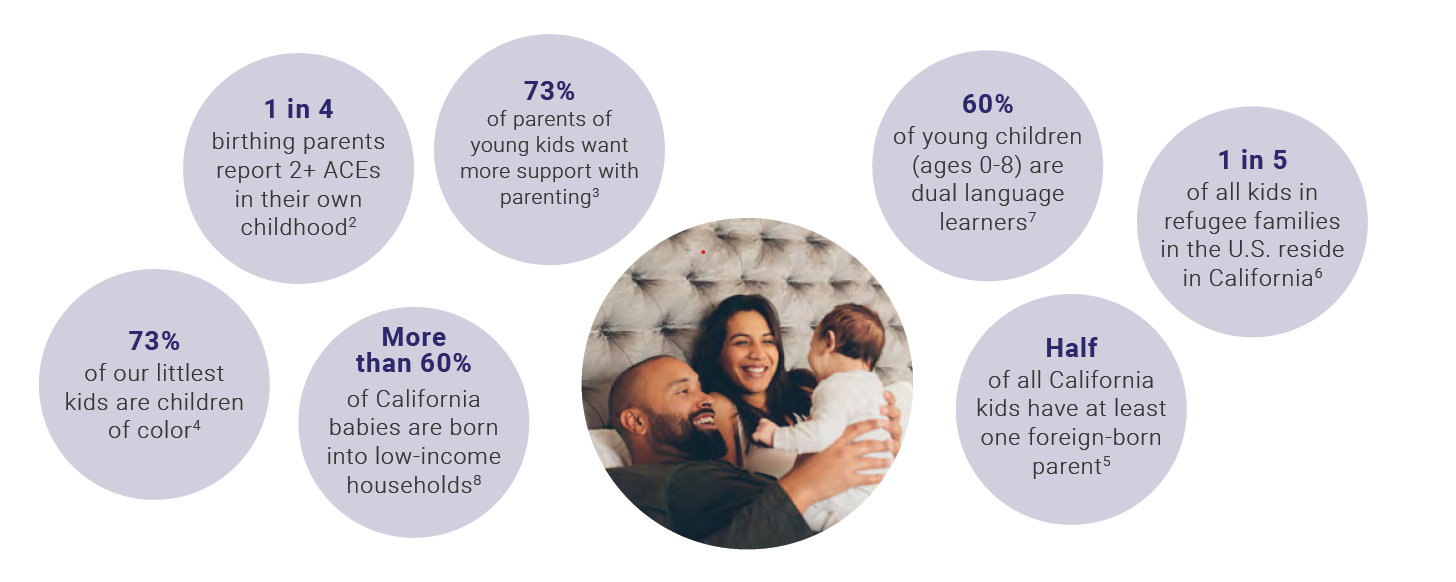It’s time for California to prioritize equity for pregnant people and infants
By Fatima Clark
November 4, 2021
Each day, nearly 1,370 babies are born in California – that’s almost one baby every minute – and half a million babies each year. That’s a lot of amazing little ones coming into the world, all of whom need safe, stable, and nurturing environments to thrive. So, what do we know about the family and community contexts into which these young Californians are born? Based on the latest data in our new factsheet we know that the majority of infants in our state are born into communities of color, and live in households with an immigrant parent and/or where English is not the primary language. Many of the state’s systems of support – already imperfect at effectively serving and supporting communities of color and low-income communities – have failed to adapt to the changing demographics of young children and families, leaving behind the vast majority of California babies and their parents who are navigating a variety of unique needs.
The urgency is immense. Lack of access to nutritious food, inadequate health care, lack of parenting support, economic insecurity, and instable housing, among other needs, if unaddressed at such a large scale, harm the health and development of children, their families, and entire communities now and for years to come.

Recent data show that the maternal death ratio for Black pregnant people is 4 to 6 times higher than for any other racial/ethnic group, and Black communities were the only group to see an increase in maternal mortality rates between 2014 and 2016 while other racial/ethnic groups saw declines.[i]
The racial/ethnic disparities seen across various health indicators today are the direct outcomes of a health care system that continuously fails to meet the needs of communities of color, and specifically Black people, because it was informed and designed by a legacy of[ii] racism and discrimination. For example, there has been an historical lack of investment in health care infrastructure in communities of color, inequitable access to health care career pathways for people of color, and implicit bias among providers, among many other inequitable policies and practices. A piecemeal response is not enough to address these deeply seated, layered barriers to equitable health and wellness: large-scale, systemic solutions are required to truly support pregnant people and infants and close racial disparities in our state. Such a shift in focus is essential and necessary to ensure all systems truly see and meet the needs of young children and parents, and a coordinated, cross-sector approach is the only way to advance whole child, whole family policies that can reach millions of Californians and have maximum impact.
State leaders must act now to fundamentally change the way that all of our state’s systems – health, education, child welfare, employment – identify and respond to the unique needs of pregnant people and babies to promote safety, stability, and their overall well-being during a critical time of development and transition. We must scale interventions with proven outcomes, integrate anti-racist and anti-bias trainings and practices at every level, and prioritize initiatives specifically designed to meet the needs of communities of color. This will require various state agencies working together to braid funding streams, develop metrics to track progress, and implement new policies that better support the unique needs of families with young children.
The path forward is clear – policymakers must choose equity and invest in young children and pregnant people to promote our state’s overall success.
Consider this: in the five minutes you spent reading this, five little Californians came into the world. Let’s make sure they and their parents have what they need from the start.
Editor’s note: to learn more about structural racism in the health care system, please visit: https://jamanetwork.com/journals/jama/article-abstract/2783091.
[i] https://www.cdph.ca.gov/Programs/CFH/DMCAH/surveillance/CDPH%20Document%20Library/CA-PMSS/CA-PMSS-Surveillance-Report-2008-2016.pdf
[ii] https://www.americanprogress.org/issues/women/reports/2019/05/02/469186/eliminating-racial-disparities-maternal-infant-mortality/
